- Home
- Dusty Richards
Once a Ranger Page 12
Once a Ranger Read online
Page 12
She deftly caught it and handily deposited it in her cleavage. “He is a mean bastardo. Why do you want him?”
He nodded slightly that he’d heard her answer. He pitched another silver dollar to her and she caught it. “Where is he hiding?”
She hesitated to drop it in her hiding place. “I don’t know. I hope he is not near here.”
“That’s yours.” He meant for her to have it.
She nodded and let it fall into her bank.
“Where can I find him?”
“Beyond the law who wants him.”
“He was in the Arizona Territory a few weeks ago.”
“I know that. I was afraid for my life until I learned he went back there.”
“Why? Did he come up here?”
She turned up her white palms. “I never learned. But I heard—”
Something made her stop. He glanced at the two vaqueros who had come in dressed in dust-floured leather. He could tell their presence bothered her.
“Do they know him?”
“No.” She lowered her voice. “They are more trouble is all.”
“What’re their names?”
“Morales brothers. The one with the scar is Thomas, his brother is Fred.”
“What do they do?”
“Murder. Beat up whores. Strong-arm and rob innocent people in the barrio.”
“I can see they’re nice guys. Where is Looman?”
“I think Nogales.”
“Big place. Where is he at down there?”
“Probably in the district of the whores.”
“Will those men pick on you when I leave?”
She shook her head. “You paid me money. Do you expect—”
He shook his head. “If you hear anything about Looman, wire me at Soda Springs. Sheriff Guthrey.”
“Oh, you’re the guy in the newspaper who ran off the old sheriff.” She laughed out loud.
With a nod for her, he rose. The scar-faced man followed his moves, then turned back to say something to his brother. Guthrey went on out the swinging doors. He made his way up the crowded street to collect his softly nickering paint horse from the livery and then, careful that he wasn’t being followed, he rode on south.
TWELVE
THE KING’S ROAD to Mexico followed the Santa Cruz River. Many small farms were joined to the stream for water. These places had been started years ago by the Catholic Church, but by this time belonged to landowners. Mostly Hispanic people inhabited the area.
Guthrey met two local ranchers in a small hotel and cantina in Tubac for supper. The waiters recommended a local wine for him to try while he feasted on his fine fire-roasted steak. They served what he called fried squaw bread along with locally raised vegetables browned in a skillet.
Over supper he spoke to the two men, both large ranchers in that area. One of the men was Javier Batista and the other Hernando Silvia. They complained to him about the lack of rain, which worried anyone with livestock. They were also concerned about the rustlers coming up the valley and rushing stolen animals into Mexico.
They laughed at Guthrey’s story of recovering the stolen horses in Mexico and congratulated him on his return of the man’s horses.
“We need more men like you in the law.”
Silvia, the smaller man, agreed and said, “Congress should have bought all of the northern part of Mexico in that last treaty. The Mexicans can’t use it because of the Apaches, and it would be ours and be over a hundred miles south of the current line.”
“Too many Catholics lived down there,” his friend said warily. “They didn’t understand how much they lost in copper and gold resources they could have developed.”
“All I know is we need more help on these border jumpers, both for the sake of Mexico and the U.S.” Guthrey cut some more bites off his flame-touched steak. “I’m looking for a killer named Looman. He has red hair and is a fugitive who escaped from Yuma.”
“I know of that scum. He robbed a friend of mine on the highway and then beat him up. There is a private reward for him of five hundred dollars.”
“I want him for murdering a family in my district.”
“But you have no power in this district.”
“I am just a citizen interested in justice when I ride out of Crook County. This man escaped the territorial prison and obviously has robbed and murdered others. Boundaries and districts should not be a barrier to let the lawless run free.”
Both men nodded. Batista spoke. “I agree, senor. I appreciate your service to your fellow man.”
“I am not here for any glory. I am here to preserve the law as a citizen. Looman is a wanted fugitive. I want him apprehended and to stand trial for his crimes.”
Silvia agreed. “You ever need a horse or help, we can lend you some, just call on us. We appreciate your concern and determination.”
His friend agreed and they ate on, and the discussion changed to crossing the native cattle with British breed bulls. That argument was endless and at last, his meal completed, Guthrey thanked the two for such an enjoyable evening and went to his room to sleep. In bed all he could think about was not having his wife to hold, but he finally fell sound asleep.
* * *
UP BEFORE DAWN, in the cool air Guthrey saddled his horse at the livery. A man named José who worked there asked him if he knew where Looman was at.
“No, do you?” Guthrey listened closely.
“I heard Senor Silvia say that you were looking for him.”
“I am. What can you tell me about where he’s hiding?”
“There is a woman who lives near the Kitchen Ranch who is his concubine. Her name is Lucia Contreras, and he may be there. He sired several kids with her.”
“Where is her place from the Kitchen Ranch?” He felt that famous place he’d heard about would be easy to locate and to recognize. That should lead him to her operation.
“There is a wagon road turns east up Rivera Creek and her place is on the left past the Kitchen Ranch.” The man waved his dark hand to the east. “She has some small crops and a garden plus an adobe jacal.”
“Will I see any markings or anything?”
“She has lots of goats.”
“Lots of goats, huh?”
He turned up his palms. “Sí, muchas cabras. I can’t recall if the first or second place is hers.”
Guthrey paid him a half dollar. “Gracias, amigo.”
The man beamed. “You are a very generous man, senor.”
He nodded and led his anxious paint horse across the dusty street to the hitch rail in back of the hotel. The woman in the kitchen had promised she would have his breakfast ready when he had his horse saddled. He washed his hands on the porch at the dry sink, dried them on a towel, and went inside. His food was set out and she sat in a chair across from his plate.
“May I join you, senor?”
“Certainly. You have no business yet?”
“Only you.” She smiled.
He tasted the coffee and considered the woman to be in her thirties, perhaps. Her hair had some gray in it but that only added to her attractiveness. He’d seen her at first in the near-dark kitchen earlier when he made a request for some breakfast. Obviously Mexican, she smiled when he spoke to her and she said, “No problem.”
She about chuckled as he started to eat. “I’m not the cook here, senor.”
“Oh, I thought—sorry.” He set down his fork and sat upright.
“My cook was not here yet and I was looking for her.” She laughed some more. “Then this handsome man came in and asked me if I’d cook him some breakfast so he could ride on. Why, of course. He must be in a rush to leave here and this would be my chance to meet him.”
Guthrey removed his hat, half stood up, and offered her his hand. “Guthrey is my name.”
She shook i
t. “Ida Bartlett. I own the inn.”
“Mrs. Bartlett?”
“Yes, I am a widow. My husband died in a mine accident a few years ago. And you are married?”
“Yes, for two months or so, maybe more—early June was the date.”
“It’s a shame. I have a ranch and a mine, and when I heard about you being here, I thought my savior had come at last to manage my operations.”
“No. I’m the sheriff up in Crook County and very happy with my job and my lovely wife, Cally. You need a man to run things for you?”
“I’d like to find one. He could even be married.” She smiled. “I have some men that are loyal to me, but they are not managers. I need someone who thinks about things and sees things that need to be done.”
“If I see someone like that, I’ll send him to you.”
“Thank you, sir. You are a sheriff now?”
“Newly elected.”
“Oh yes, it was in the Tucson paper. You rounded up several criminals and even the ex-sheriff.” She raised her eyebrows like he had accomplished a big deal.
“Things were really bad up there. No law anywhere.”
“And you are here today?”
“Looking for a murderer as a private citizen.”
“May I ask his name?’
“Looman.”
A shocked look came to her smooth face as if she were alarmed. “Be very careful, mi amigo. He’s killed many good men.”
“I have heard that. Do you know where he is hiding?”
She quickly shook her head.
Busy eating the rich food she fixed, he looked up. “You’re a very good cook. I am surprised you don’t have many men after you.”
“Not the men I want. They only want my money. They are lazy. They drink too much. They shout too much. I am so damn fussy I can’t take a one of them.”
“Now, ain’t that the truth. I met some nice ladies needed husbands, but I found things they did that upset me, so I never got married for a long time. My sister said I was too fussy too.”
She laughed. “Find me such a man.”
“I will look.”
“No. You have in mind to find this killer. You are being nice to a lady, but you have no time to go and look for a man for me. But I forgive you.”
“What do I owe you for this breakfast?”
“Hmm,” she snorted. “I have fed a new friend and sent him off to war. I don’t want your money.”
“I thought I had found the cook in the dark kitchen this morning.” He laughed.
“You are a devil, Guthrey. Stop by again and see me.”
“Someday I will. Thanks, Mrs. Bartlett.” He put on his hat and headed for the front door. Outside in the cool shadows of a dawn that was hiding behind the tall mountain in the east, he unhitched the horse, took the stirrup, and then swung aboard. He checked the horse with the bridle bit, then he saluted her, standing in the doorway, and rode on.
Cottonwood leaves the size of silver dollars fluttered overhead and birds chirped in the sanctuary of the trees. Along the road bold ravens fed on horse apples for the grain they contained, and the topknot quail scurried off in the weeds. Guthrey heard a cow bawl for her calf and some mules honked in the distance. Already some rigs were on the road and passed him going north. He headed for the border as the heat began to rise up from the hard road surface and into his hat-shaded face.
He located the Kitchen Ranch by speaking in Spanish to a man walking along the highway. Then he cut off on the road the liveryman told him about and went past the ranch until he heard the goats. Not much happening. He wanted to try to scope it out from a distance, and then he spotted a nearby hill. He took a farm path and his horse stepped over a rushing small ditch, carrying him to the base of the hill. In the willows, he hobbled Cochise, then took the field glasses and climbed up the backside of the hill with a canteen.
This day would require lots of patience on his part. Guthrey felt confident he’d found a reliable spot to spy on Looman and one Lucia Contreras. The place had lots of vegetation and goats. He saw some children playing with the kids and some stock dogs. A young woman caught a couple of chickens in a cloud of dust and feathers, obviously intending the fowl for slaughter—was company coming?
Butchering of poultry usually meant there would be visitors to feed and special ones to be around the table. The hours passed and two men rode into her place, but they were hard to make out, though Guthrey could see one was a Mexican boy who led their horses around to a corral. Though not very old, maybe ten or twelve years, he unsaddled the horses, currycombed them, and fed them green corn and stalks from the garden. The children had been herded outside too. The oldest ones cared for the younger ones in the yard. No sign of the woman or the man. All Guthrey wanted was to see him and verify that his wanted man was there. What those two grown-ups did to each other, he didn’t care about—just so Looman would be there when the sun came up and he was ready to arrest him.
He spotted the man’s red hair when he came outside to empty his bladder. It was Looman, all right. Satisfied on that matter, Guthrey collapsed his brass telescope. Having had enough of that for the day, he climbed off the hill and found the paint stallion, unhobbled him, and rode on into Nogales. He put his horse in a livery. He told the stableman to grain him and went to where they said there were some clean rooms to sleep in.
The streets were quiet on the U.S. side. After he secured a room for the night at the inn, he ate supper from a street vendor. Sitting on his haunches, eating his wrapped meal, he noticed several hipshot horses standing at a hitch rail across the open border in Mexico in front of a cantina. Must be payday for some vaqueros and they were celebrating in that place. Guthrey didn’t need any celebrating after he finished his meal. Returning to the inn, he found the ten-cent bed and the blanket the clerk handed him. Tired, and anxious to get up early to go to Lucia’s place and arrest the killer, he soon went to sleep. His revolver was near his hand under the covers just in case. . . .
* * *
BEFORE DAWN GUTHREY found a woman cooking in the town’s street. She made him a large flour tortilla, filled it with meat, beans, chili, and a sauce for a dime. He gave her two dimes and then went for his horse. The hostler saddled Cochise for Guthrey. They talked softly about the need for the monsoons to start, the cool air sweeping out the canyon that formed the sides that Nogales huddled in. The rich, spicy contents of the burrito tasted good to him.
He swung into the saddle, thanked the man, and tossed him a quarter for his troubles.
“Anytime you come back, senor, look for me. My name is Agnos.”
“I will, Agnos. Thanks.”
The air was cool in the predawn. Guthrey, wondering how this day would turn out, checked his anxious horse, who also acted like he understood things were going to happen soon.
Noticing a stranger in the yard, the goats stampeded away in a panic away when Guthrey got beyond the gate of Lucia Contreras’s house. Then, filled with curiosity, they came back to check him out. None of the dogs even barked, and once he had the horse hitched securely, he checked around. He went across the ground to the adobe jacal, hoping the goats wouldn’t follow him too soon.
He made the house and the goats had begun bleating. Six-gun in his hand, Guthrey went to the green, peeling-paint door and jammed it wide open with his boot.
“Don’t go for a gun!” Guthrey shouted. But he saw the figure diving for a holster and he shot in that direction. The man screamed.
The woman yelled, “You’ve killed him!”
“Don’t move or you’re next.” Breathing loudly through his nose, Guthrey stepped around the bed in the thick gun smoke. Two children on pallets were crying. He jerked the woman away from the outlaw to stop her from getting a gun and tossed her aside on the bed. She shouted, cussed in Spanish, and charged him on all fours.
Guthrey gave her a rap on t
he head with his gun barrel, and she went facedown on the rumpled blankets. Guthrey never liked to hit a woman, but she wasn’t taking his orders. He caught Looman by the collar of his underwear suit and dragged him outside, the outlaw screaming that he was shot and dying.
Guthrey had to handcuff him, then go back in to get Looman’s gun. The woman might recover and try to use it. Looman was lying facedown in the dirt with the cuffs on his wrists, crying, “I’m shot. I’m shot. You’re killing me.”
“I’ll do worse than that.” Guthrey straightened in the midst of all the curious goats that were jumping all over each other trying to back away.
Looman’s left arm was bleeding and there was a tear in the sleeve, but Guthrey couldn’t see any other wounds on his dust-floured union suit. That outlaw ought to be grateful to be alive, but his kind considered freedom their only salvation.
“Stay put,” he ordered and, holding the six-gun in his fist, he went back inside. The woman was holding her head.
“Don’t hit me again,” she screamed and crawfished away from him with blood on her forehead and hand.
“Don’t never threaten me again, lady. I don’t hit women unless they try me.”
The spent gunpowder left a powerful sulfur smoke that hung in the air when he finally located Looman’s gun belt. Guthrey holstered his own gun and then put the prisoner’s in the sheath, latched the buckle, and slung it over his shoulder. A half dozen dark eyes followed his every move. Nothing else in there worth ten cents—only a fecal smell mixed with the sharp haze. He went back outside. Dressed in white clothing, the Mexican slave boy stood there looking at his handcuffed boss, wide-eyed and afraid, ready to run.
“Saddle your horses, and get ready to ride.” Guthrey spoke in Spanish. “We’re going to Tucson. One mistake and I’ll shoot you. You savvy?”
“Oh, sí, senor.”
“What is your name?”
“Raphael.”
“Is she your mother?”
“No. But I will work for you.”
“Good, Raphael. You behave, I won’t cuff you.”
“I will, senor.”

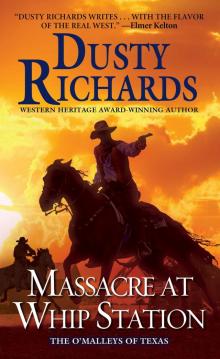 Massacre at Whip Station
Massacre at Whip Station Blue Roan Colt
Blue Roan Colt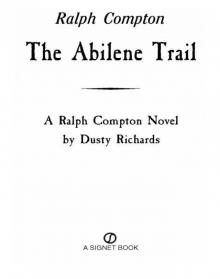 The Abilene Trail
The Abilene Trail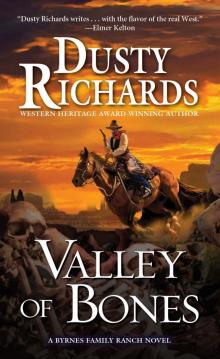 Valley of Bones
Valley of Bones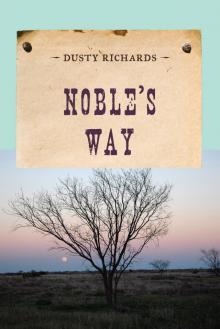 Noble's Way
Noble's Way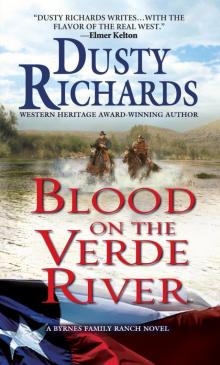 Blood on the Verde River
Blood on the Verde River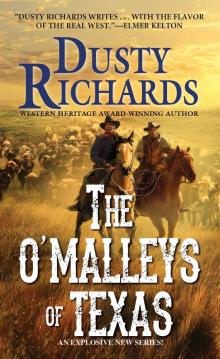 The O'Malleys of Texas
The O'Malleys of Texas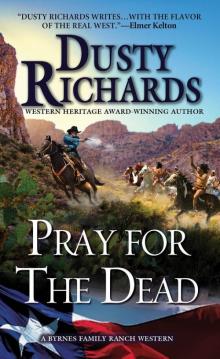 Pray for the Dead
Pray for the Dead Arizona Territory
Arizona Territory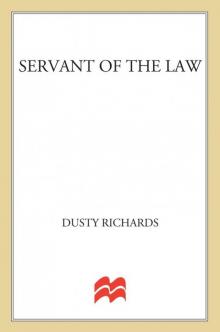 Servant of the Law
Servant of the Law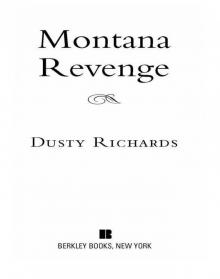 Montana Revenge
Montana Revenge The Sundown Chaser
The Sundown Chaser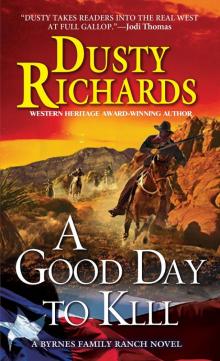 A Good Day To Kill
A Good Day To Kill Deuces Wild
Deuces Wild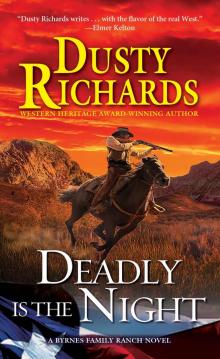 Deadly Is the Night
Deadly Is the Night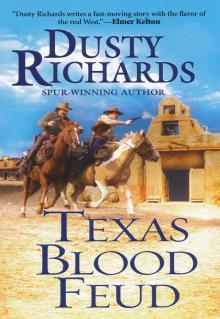 Texas Blood Feud
Texas Blood Feud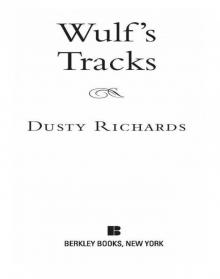 Wulf's Tracks
Wulf's Tracks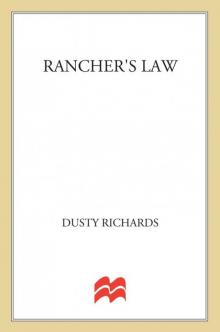 Rancher's Law
Rancher's Law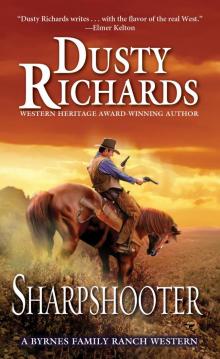 Sharpshooter
Sharpshooter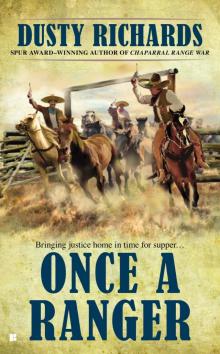 Once a Ranger
Once a Ranger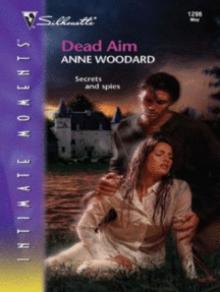 Dead Aim
Dead Aim Lawless Land
Lawless Land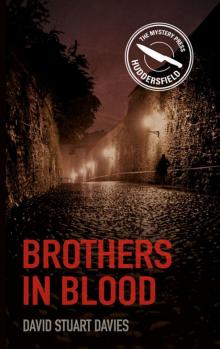 Brothers in Blood
Brothers in Blood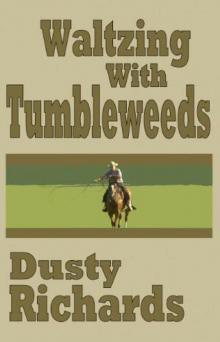 Waltzing With Tumbleweeds
Waltzing With Tumbleweeds